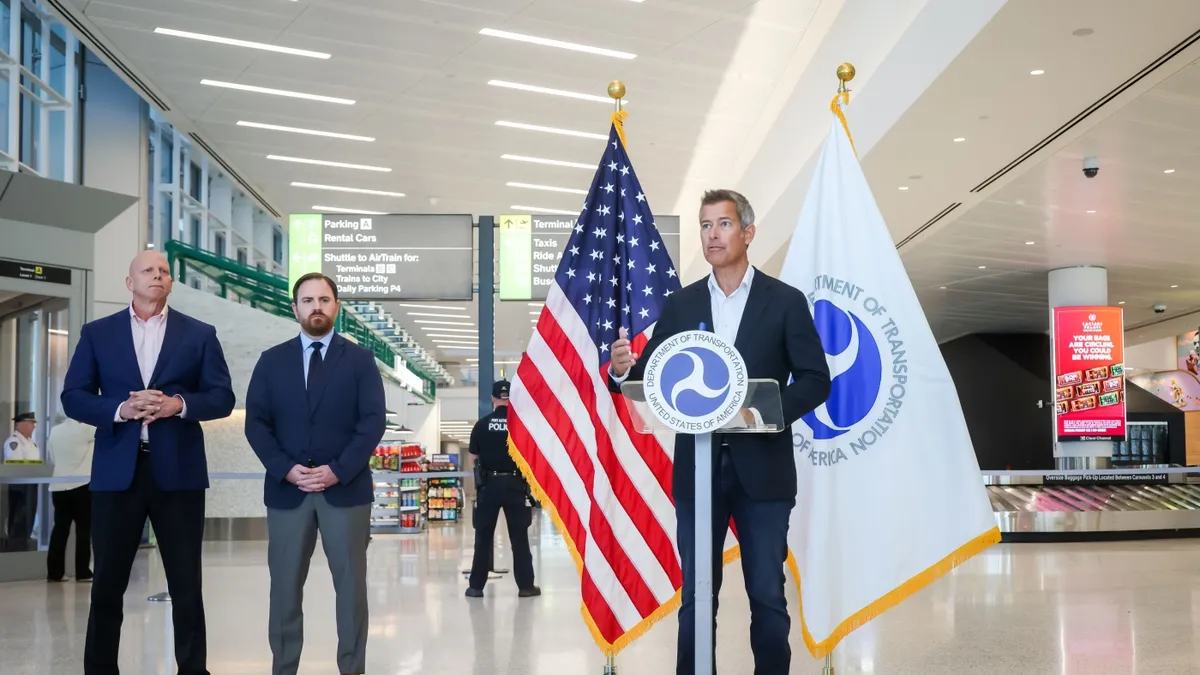
Travelers across the U.S. are increasingly feeling the repercussions of the recent government shutdown, which has led to significant disruptions in air travel. The shutdown has resulted in air traffic control staffing shortages, causing delays and cancellations at numerous airports nationwide. On Monday, a dozen Federal Aviation Administration (FAA) facilities reported staffing issues, prompting an evening advisory from the agency.
During a press conference at Newark Liberty International Airport in New Jersey, Transportation Secretary Sean Duffy attributed these nationwide delays to a spike in sick calls among air traffic control workers. He noted that many controllers are expressing concerns about working without pay during the shutdown, with some considering alternative employment options, such as driving for Uber. Duffy warned that the situation may worsen until the government reopens, stating, “If we see issues in the tower affecting controllers’ ability to effectively manage airspace, we will reduce the rate of flights, leading to increased delays or even cancellations.” He emphasized the commitment to safety, saying, “I’m willing to do that before risking anyone’s life in the air.”
In an official statement shared with NPR, the FAA indicated that it would slow traffic into certain airports to maintain safe operations during increased staffing shortages. Travelers are advised to visit the FAA's website for real-time updates on flight impacts at every U.S. airport.
As the government shutdown continues, politicians from both sides are blaming each other for the resulting travel chaos. The shutdown, which began on October 1, arose from partisan disagreements primarily over health care subsidies, preventing the Senate from passing a crucial funding bill. Historical precedents show that air traffic controllers played a pivotal role in ending the last government shutdown, which lasted for 35 days from December 2018 to January 2019. During that shutdown, a slight increase in sick leave among controllers led to significant disruptions at major East Coast airports, intensifying pressure on the administration to reach a spending agreement with Congress.
Long-standing controller staffing shortages—exacerbated by inadequate hiring practices, extensive training timelines, and high dropout rates—persist as a significant challenge. Even a minor uptick in sick calls can have a profound impact on flight operations, as evidenced by Monday's events.
According to the FAA, delays were reported across the country, impacting major cities including Phoenix, Denver, Chicago, Indianapolis, and Washington, D.C. Newark and Denver airports experienced ground delays due to these staffing issues, with flights delayed an average of 53 minutes from Newark and 39 minutes from Denver. However, some flights faced delays of nearly two hours. The most significant disruptions were reported at Hollywood Burbank Airport near Los Angeles, which endured average ground delays of two and a half hours and had no air traffic controllers available for over five hours on Monday. California Governor Gavin Newsom criticized President Trump via Twitter, stating, “Burbank Airport has ZERO air traffic controllers from 4:15 PM to 10 PM today because of YOUR government shutdown.”
During the press conference held by Duffy, Nick Daniels, the president of the National Air Traffic Controllers Association (NATCA), refrained from political commentary and instead called for an end to the shutdown. He emphasized the need for the FAA and dedicated aviation safety professionals to focus on their essential roles without the distraction of a shutdown. NATCA, which represents over 20,000 air traffic controllers, indicated that many of its members were already working extensive hours, and the shutdown has further strained operations by furloughing safety support staff and suspending essential support programs.
NATCA's website warns its members against participating in job actions, highlighting the legal repercussions and potential to undermine the association’s credibility. Despite the challenging circumstances, NATCA confirmed that nearly 11,000 fully certified controllers remain on duty, noting that a few sick calls are typical on any given day. However, they also pointed out that Monday’s events highlighted the fragility of the U.S. aviation system and underscored the urgent need for accelerated training and hiring processes.
Since the commencement of the second Trump administration, Secretary Duffy has advocated for a significant overhaul of the country’s air traffic control systems, many of which still rely on outdated technology. He stressed that the ongoing shutdown hampers these efforts and poses potential long-term impacts on addressing current air traffic controller shortages. “This situation is having a considerable impact on our system at a time when we’re trying to alleviate stress,” Duffy remarked.
The government shutdown could also have dire consequences for rural airports. Secretary Duffy cautioned that the Essential Air Service (EAS)—a federal program that subsidizes commercial flights to rural airports in approximately 170 communities—could run out of funding as soon as Sunday. “Every state across the country will be affected by the inability to provide subsidies to airlines servicing these communities,” Duffy stated, noting that Alaska is likely to experience the most significant impact. Earlier this year, the White House proposed cutting the EAS program’s funding by over 50%, despite bipartisan support in Congress.
Natasha Marquez, a spokesperson for the Regional Airline Association, informed NPR that prior to the COVID-19 pandemic, the EAS supported more than 17,000 U.S. jobs and facilitated hundreds of daily flights from airports located an average of 200 miles from medium or large hub airports. This means that many travelers could feel the implications of the program's potential funding cuts. An Alaska Airlines spokesperson indicated that if the government shutdown persists beyond Sunday, the airline would be relieved of its obligations as an EAS provider for several communities, with the Department of Transportation likely suspending reimbursements.